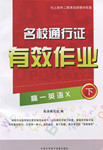题目内容
Every time he ______ to visit me, he ______ buy me some books.
A. will come; will B. will come; would
C. comes; will D. comes; would
练习册系列答案
 名校通行证有效作业系列答案
名校通行证有效作业系列答案
相关题目
题目内容
Every time he ______ to visit me, he ______ buy me some books.
A. will come; will B. will come; would
C. comes; will D. comes; would
 名校通行证有效作业系列答案
名校通行证有效作业系列答案